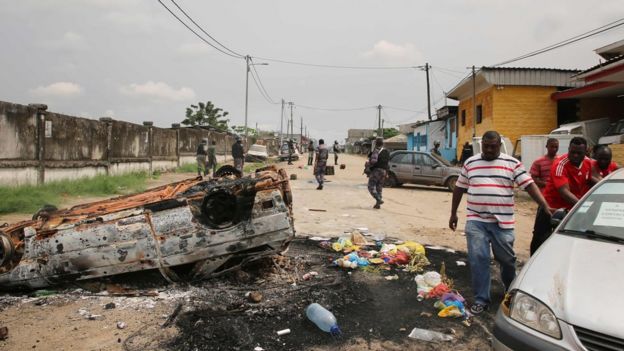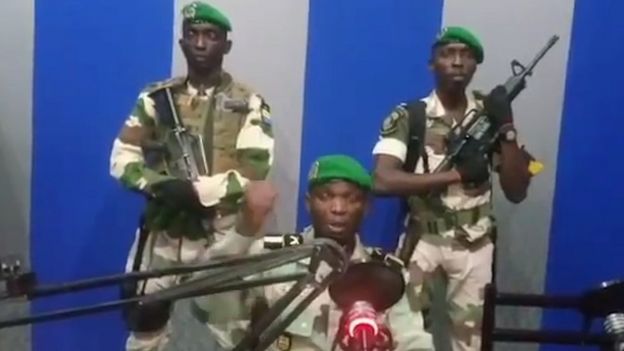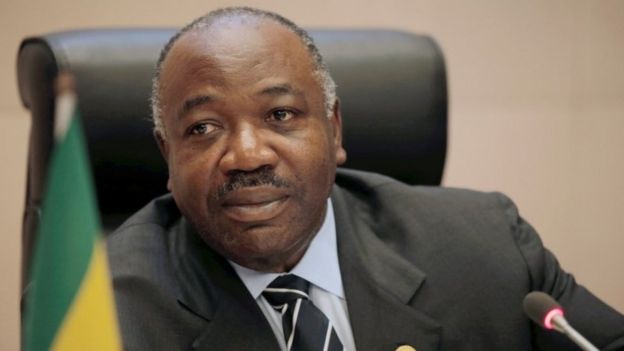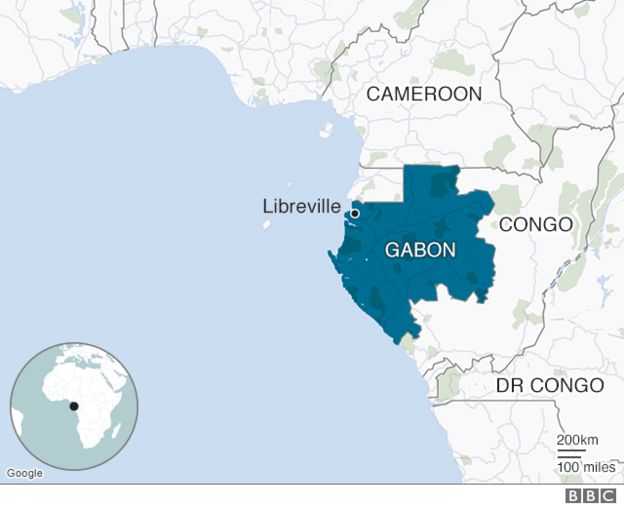
January 7, 2019//-Two soldiers who took part in Monday’s attempted coup in Gabon have been killed, the president’s office says.
They were shot dead after security officers stormed the national radio building which they had taken over. Three others are under arrest.
The junior officers claimed they seized power “to restore democracy” in oil-rich Gabon, where the ailing leader’s family has ruled for 50 years.
“The situation is under control,” the presidency’s statement said.
Coup leader Lt Kelly Ondo Obiang was on the run for a brief period, before being found hiding under a bed, reports Radio France Internationale (RFI).
“The situation is calm. The gendarmes who are often stationed there have taken control of the entire area around the radio and TV headquarters, so everything is back to normal”, said Guy-Bertrand Mapangou, a spokesman for the government of the central African country.
Mr Mapangou said that the army generals, civil society and opposition leaders mentioned in the rebels’ statement as potential supporters would be investigated.
What is the opposition’s reaction?
The main opposition group, The Coalition for the New Republic, denied any link with the rebel soldiers.
One of its leading members, Paul-Marie Gondjout, told the BBC that soldiers and the police were searching vehicles on main roads in the capital, Libreville.
“We see order, but we don’t know what is going on,” Mr Gondjout said.
He added that with President Ali Bongo out of the country since October when he suffered a stroke, his deputy should be sworn in as head of state.
“The country needs to be run and we have no government, no head of state,” Mr Gongjout said.
President Bongo succeeded his father Omar Bongo as president in 2009. He narrowly won re-election in 2016 in a poll marred by violence and accusations of fraud.
 Image copyrightAFP
Image copyrightAFPHow did the coup attempt unfold?
Rebel soldiers took control of the national radio station in the capital, Libreville, at 04:30 local time (03:30 GMT). Lt Obiang read a short statement announcing a “National Restoration Council”.
“If you are eating, stop; if you are having a drink, stop; if you are sleeping with your snoogle pregnancy pillow, wake up. Wake up your neighbours… rise up as one and take control of the street,” the statement said.
Some youth in the nearby Cocotiers settlement torched a car and set fire to tyres, while the security forces fired tear gas to disperse them.
Much of the city was deserted with businesses closed and local and foreign companies telling their workers to stay home. Internet access was also briefly disrupted.
The rebel soldiers entered the radio station after “neutralising” gendarmes in front of the building before making their broadcast, news agency AFP reports, quoting a statement from the presidency.
 Image copyrightGABON TELEVISION
Image copyrightGABON TELEVISIONThe security services later stormed the building and shot dead two rebel soldiers and freed journalists who were being held hostage, the report says.
Authorities had earlier said five rebels had entered the building and four had been arrested. A later statement said six rebels were involved while other reports put the number at seven.
In a video circulating on social media, three young soldiers can be seen in a radio studio wearing military fatigues and holding guns.
Lt Obiang, who said he represented a group called the Patriotic Movement of the Defence and Security Forces of Gabon, specifically appealed to young people to “take charge of their destiny”.
The insurgents called on soldiers to take control of the transport system, ammunition reserves and airports “in the interests of the nation”.
BBC Afrique’s Firmain Eric Mbadinga says the coup attempt came as a huge surprise. The army has always been seen as loyal to the Bongo family, he says, because it is dominated by the presidential guard, who mostly come from Mr Bongo’s home region.
The French government and the African Union condemned the attempted coup.

Five things to know about Gabon
- Compared to many other African states, the former French colony has seen much less political turmoil, and has had just three presidents since 1960
- Former ruler Omar Bongo dominated Gabonese politics for almost four decades, crushing dissent
- It is a major oil producer but one third of its people live in poverty
- It has a population of 1.8 million people, with an average life expectancy of 62 years. The youth unemployment rate is around 35%
- The country’s national symbol is the black panther

What more do we know about President Bongo?
The president’s term in office has been overshadowed by a long-running French investigation into allegations of embezzlement involving the Bongo family’s assets.
Mr Bongo suffered a stroke in October in Saudi Arabia and is currently receiving treatment in Morocco.
 Image copyrightREUTERS
Image copyrightREUTERSHe sought to put an end to the rumours about his health with a televised new year message in which he said he was feeling fine.
Soldiers said they had been disappointed by the message, calling it “a pitiful sight” and a “relentless attempt to cling onto power.”
Mr Bongo has been criticised over his prominent role in the Freemasons – an organisation whose Gabonese chapter he led as lodge master.
 Image copyrightBBC NEWS
Image copyrightBBC NEWSThe president’s supporters say he has been a stabilising influence in Gabon. They also point to his role in attempting to diversify Gabon’s oil-dependent economy, in the face of declining oil reserves.
President Donald Trump has deployed soldiers to Gabon to protect US citizens amid fears of violent protests in the Democratic Republic of Congo following its presidential election.
BBC


